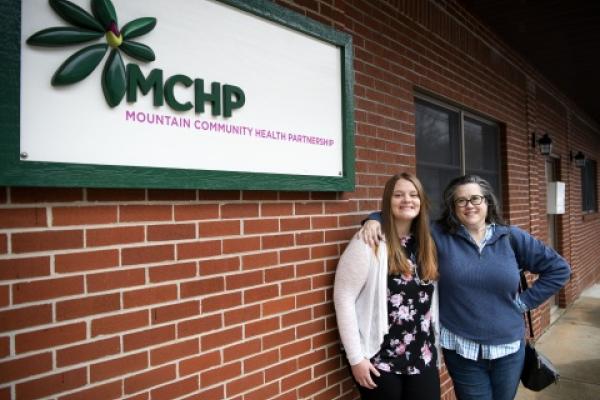
Gina Phillips (right) directs the Phillips Family Foundation, which funds Duke PA student rural health experiences in Bakersville, N.C. Kendra Rumback (left), 2018 Duke PA program alumna, participated in the rotation and now works at the clinic.
It’s a four-hour drive west across the state of North Carolina from Durham to Bakersville, a small town in Mitchell County.
Most of the drive is on Interstate 40, but the last hour is entirely different. It begins with a sharp turn onto N.C. Highway 226. From there, the country road ambles through rugged communities of farmhouses, antique shops and old drug stores before snaking up the base of the Blue Ridge Mountains, switchbacking every 100 feet or so. A look out the window is breathtaking, as the sheer drop-offs are just inches from the road.
Life is different in the mountains. Mitchell County native Gina Phillips will be the first to tell you. The closest “big” cities — Asheville and Johnson City, Tenn. — are at least an hour away and can become unreachable during winter months. There are few chain stores. Mom-and-pop art galleries filled with softly swirled pottery — much of it made by artists at the nearby Penland School of Crafts — line the quarter-mile stretch that is downtown Bakersville, along with home-style cooking restaurants like Mammie’s Kitchen and Helen’s Restaurant.
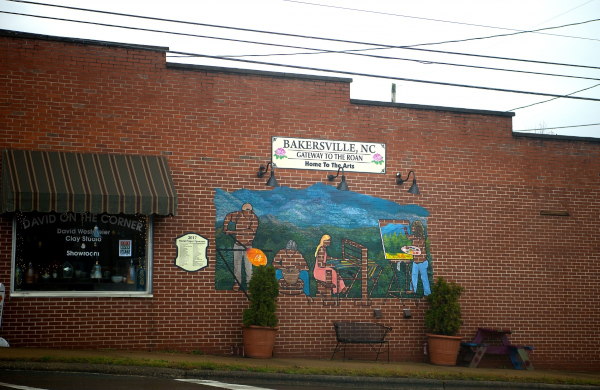
Grungy, tired hikers trek in from the Appalachian Trail, which skirts the town and goes on to pass over rhododendron-covered Roan Mountain, earning Bakersville the moniker “Gateway to the Roan.”
Despite its natural beauty and wealth of artistic talent, Bakersville is an economically-challenged town. Its population of just under 500 people is decreasing and aging. And due to its small size and remote location, the area offers few sustainable work opportunities.
This puts a unique strain on the Bakersville Community Health Center, a clinic on the downtown stretch that is designated as a Federally Qualified Health Center, meaning that it receives federal money to offer primary and preventive care to people regardless of their ability to pay or their health insurance status.
Bringing Them to Town
Phillips has high hopes for her county. That’s why she helps to recruit Duke University physician assistant (PA) students for longitudinal clinical rotations at the health center.
Phillips directs the Samuel L. Phillips Family Foundation, a philanthropic organization named for her parents, and uses foundation money to fund a scholarship that enables a Duke PA student to complete four months of clinical rotations at the Bakersville Community Health Center each year. She trusts that students will see mountain life as a good kind of different, and maybe even decide to come back after their PA education at Duke is complete.
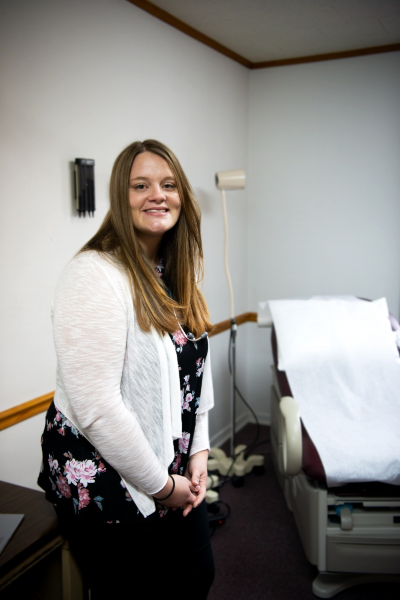
The Duke Physician Assistant Program requires that all students complete at least a four-week clinical rotation in a medically underserved area during the second year of the program, so they can see firsthand the challenges and opportunities that a career in primary care provides. This type of training is what Duke PA program and profession founder Eugene A. Stead, Jr., M.D., former chair of the Department of Medicine at Duke University School of Medicine, had in mind when he began the program in 1965.
“The rotation is consistent with our mission and with Dr. Stead’s intention that PAs would increase access to care wherever they practice,” says Patricia McKelvey Dieter, MPA, PA-C, professor in the Duke Department of Family Medicine and Community Health and PA division chief. “Many of our rotations in medically underserved settings are in rural areas, where access to care may be the most challenging.”
Dieter says the four months that a PA student spends in Bakersville allow for an especially immersive experience in rural practice for students who have experiences and interests that suggest they may practice rurally.
Phillips found a kindred spirit in Kendra Rumback, MHS, PA-C, a 2018 Duke PA graduate who was a recipient of the Phillips scholarship and completed her rotation at the Bakersville clinic in 2017. When Rumback first arrived in Bakersville, she was enamored with the natural beauty and quaint feel of the downtown area. Originally from Salt Lake City, Utah, the mountains were a familiar friend. What took her by surprise, though, is the instant connection she felt to the community, which stymied any feelings of isolation.
“It just feels like a big family,” says Rumback. “The people in the clinic feel like family members and so do the patients that come in. Most of the providers and the staff here know them — know who they are, know their whole family. That’s a totally different experience from being in a big city.”
Rumback loved the area so much that she decided to apply for a full-time position at the clinic. She was hired and began work in November 2018. She is one of 10 health care providers at the Bakersville Community Health Center, including other PAs, nurse practitioners and four physicians.
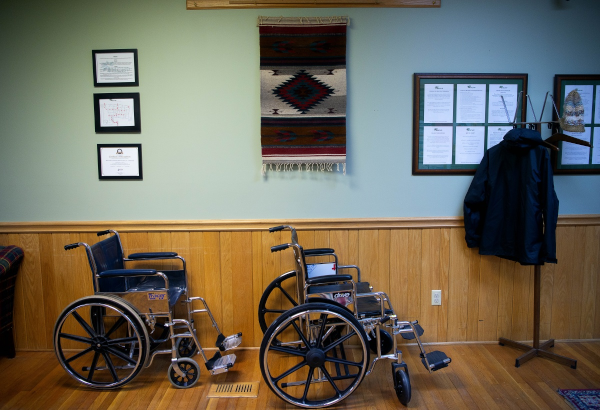
A Day in the Life
Working in primary care, a typical day is not typical. The staff accommodates scheduled appointments as well as walk-ins. Patients with extreme emergency situations, such as heart attack, stroke or severe bleeding, are rushed 15 minutes away to the hospital in Spruce Pine, but the Bakersville staff treats most other types of diseases and injuries.
Like many clinics serving an older population, the clinic staff helps patients manage chronic illnesses such as heart disease, cancer and diabetes. They also treat an abundance of patients dealing with issues related to poor dental care, which Rumback says is related to a lack of fluoride in the water, as well as high instances of smoking and poor dietary choices.
“That, and also just not having access to affordable dental care,” says Rumback. “Patients, when they do have a problem, come in to see us for antibiotics when they really should be going to a dentist.”
In bigger cities, patients with more severe psychiatric conditions like bipolar disorder or schizophrenia would see a specialist. But in Bakersville, these cases are often managed by primary care physicians and PAs. Substance abuse and psychiatric illness cases also fall to primary care staff like Rumback.
“There’s a lot of substance abuse, and some of our providers are actually working on medically assisting patients here at our clinic, but that requires a lot of behavioral health, as well,” she says. “We do have some [behavioral health specialists] that work here at our clinic but I think just having more access to resources in the community would be helpful.”
The Power of Community
Chuck Shelton, CEO of the Mountain Community Health Partnership (MCHP), the organization that runs the Bakersville center along with two other health centers in the area, says that administrators were thrilled when Rumback joined the team in the fall.
“We’re so pleased she has joined MCHP and know she’s going to be a valuable asset to the clinic and our patients,” he says.
In addition to the Bakersville Community Health Center, the partnership operates health centers in the towns of Spruce Pine and Burnsville. The Bakersville Community Health Center opened in 1974, Shelton says, and was formed as a community-owned nonprofit clinic. Shelton credits Jim Bernstein with the North Carolina Office of Rural Health for helping rural health care get started in North Carolina. Bakersville was one of the first towns the office invested in.
“The Office of Rural Health said if your community will raise some funds, we’ll give you enough to get started with a nurse practitioner,” says Shelton. “The city fathers as they were — the guy who owned the car dealership, the guy who owns the funeral home, the mayor — they went out door to door and raised $13,000, which was a lot in 1974 from this community. The Office of Rural Health gave us about $60,000 and that was the seed money to start the organization.”
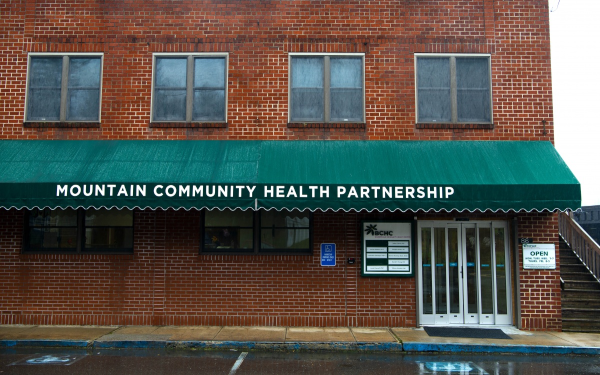
Since then, the Bakersville clinic has grown from one building to engulf two neighboring buildings: a former tire shop and former hardware store. As a Federally Qualified Health Center, it can offer extended care to patients at a low cost. And with the help of the Samuel L. Phillips Family Foundation, it can recruit PAs from one of the top PA training programs in the country.
For Gina Phillips, it was a no-brainer to turn to Duke University for help with improving health care in her region. She thinks it’s what her father, Sam, would have wanted. A Bakersville native, he attended Duke University for a few years, but after the bombing of Pearl Harbor, left to join the military. After World War II ended, he attended the University of Georgia to complete his bachelor’s degree with help from the GI bill. He and his wife, Jewel, then moved to Washington, D.C., where she worked for the Pentagon to put him through law school at George Washington University. Shortly after, he began a job as a legal clerk.
After World War II ended, the government was starting a strategic stockpile of natural resources because they had run short during the war, says Phillips. Her father knew his home region to be rich in mica, the mineral that became a key building component for transistor radios. He and Jewel became involved with the U.S. Mining Department and founded a national program to harvest mica in North Carolina and several other states.
Phillips recalls her father’s passion for his hometown and Duke University. It runs in the family, as her brother, Byron Phillips, also on the foundation’s board of directors, is a Duke alumnus, having earned his MBA from the university in 1982. Phillips thinks her father would have been proud to bring students from Duke to his hometown to show them around, and she makes a special point to do this each time a new PA student comes to Bakersville. She sees the partnership, now in its fourth year, as a win-win for students and for her community.
“We want people who are committed not to a hospital system but to a way of life, to the small-town lifestyle,” she says. “We need people who see simplicity as a virtue.”
Phillips is proud that her family’s gift recruited Rumback to town.
“I hear that people come in and ask for her [at the clinic],” she says. “To me, that’s very telling about the level of compassionate service she provides.”
Lindsay Key is a science writer for the Duke University School of Medicine.
Photos by Maddy Alewine